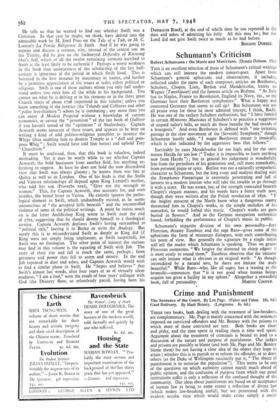Schumann's Criticism
Robert Schumann : On Music and Musicians. (Dennis Dobson. 15s.)
THis is an excellent selection of those of Schumann's critical writings which can still interest the modern concert-goer. Apart from Schumann's general aphorisms and observations, it includes, collected under the name of each composer, articles on Beethoven, Schubert, Chopin, Liszt, Berlioz and Mendelssohn, letters on Wagner (Tannhiiuser) and the famous article on Brahms. "As Italy has its Naples, France its Revolution, England its Navy, etc., so the Germans have their Beethoven symphonies." What a happy and contented Germany that seems to call up! But Schumann was not all praise even for those he most admired (except, I think, Bach). He was one of the earliest Schubert enthusiasts, but "I have fancied in certain Moments Musicaux of Schubert's to perceive a suggestion of unpaid tailor's bills, so much do these breathe the bad moods of a bourgeois." And even Beethoven is debited with " one irritating passage in the slow movement of the (Seventh) Symphony," though Schumann hastily adds, " I wager Beethoven meant it ironically, which is also indicated by- the aggressive bass that follows."
Inevitably he rates Mendelssohn far too high, and for the same reason Haydn far too low ("Today it is impossible to learn anything new from Haydn "); but in general his judgement is wonderfully free from the prejudices of his generation and, still more remarkably, from personal pique or spite. Berlioz was not a naturally sympathetic character to Schumann, but the long essay and analysis dealing with the Symphonie Fantastique is extremely penetrating and full of interest to a modern listener who will take the trouble to go through it with a score. He was aware, too, of the strength concealed beneath Chopin's elegant manner, and his words have a bitter truth now, though they were written after the Polish revolution of 183o. " If the mighty autocrat of the North knew what a dangerous enemy threatened him in Chopin's works, in the simple melodies of his mazurkas, he would forbid this music. Chopin's works are guns buried in flowers." And so the German occupation authorities found, forbidding the performance of Chopin's music in public.
Schumann's tripartite division of his own personality—fiery Florestan, dreamy Eusebius and the sage Raro—gives some of the aphorisms the form of miniature dialogues, with each contributing his point of view. But generally the signature by a single initial will tell the reader which Schumann is speaking. Thus on genius Florestan comments, " We forgive the diamond its sharp edges: it is most costly to round them." Eusebius observes that the imitator can only imitate what is obvious in an original work: "As though intimidated by a natural awe, he dares not imitate the truly beautiful." While Raro—who, like all sages, has a leaning to the bromidic—announces that " it is not good when human beings acquire too great a facility in any sphere." Altogether a rewarding


































 Previous page
Previous page